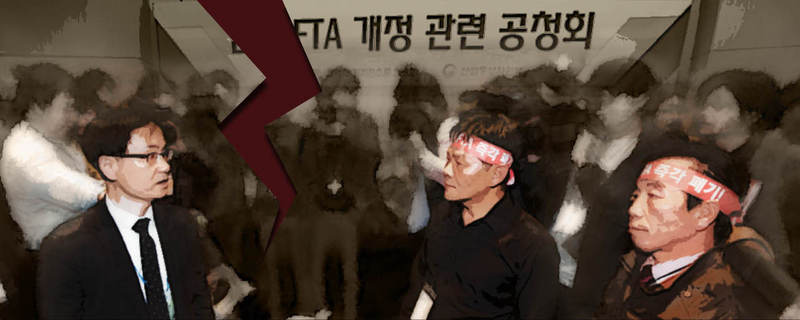Posted on : Nov.11,2017 16:43 KST
Modified on : Nov.11,2017 16:49 KST
Farmers and livestock groups voice skepticism that KORUS FTA revisions will leave their industries untouched
Findings from an economic feasibility study on amendment of the South Korea-US Free Trade Agreement (KORUS FTA) are stirring up controversy after their presentation at a Nov. 10 public hearing by the Ministry of Trade, Industry and Energy (MOTIE) and the state-run Korea Institute for International Economic Policy (KIEP).
Kim Young-gwi, head of the regional trade cooperation team for KIEP’s trade headquarters, predicted South Korea’s real GDP would “increase by an additional 0.0004–0.0007%” if additional openness is implemented according to the US demands for products where tariffs remain in place. Kim also said consumer welfare would “increase by US$12–24 million.”
Daegu University economics professor Kim Yang-hee dismissed the numbers as “meaningless,” contending that even the basic information needed for a hearing to discuss amendments to the FTA was insufficient. “The important question is what effect the FTA’s amendment will have on farming, livestock, and other others. None of that is here,” she said.
Among the products where South Korea would have to remove tariffs sooner or lower them additionally in future FTA amendment negotiations in response to US pressures to address its trade deficit, few are in the area of manufacturing. Duties of 2.5% were applied to South Korean automobiles exported to the US for the first four years after the FTA took effect in 2012, but were abolished as of Jan. 2016.
For this reason, many have predicted the US’s demands will center on additional openness in services (including intellectual property rights, legal, and financial services); looser regulations on place of origin, labor, and the environment; and additional farming and livestock industry openness. Even Kim Young-gwi acknowledged that “remaining tariffed products are limited and their tariff rate is not high,” saying the effects from amendment there would be “limited.”
“The macroeconomic effects could increase if we factor in the removal or loosening of non-tariff barriers and other areas,” Kim predicted.
The administration has maintained it cannot open the farming sector any more. In an opening address at the hearing, Deputy Minister for Trade Kang Sung-chun said Seoul would “pursue discussions [with the US] from a standpoint of prioritizing the national interest and balancing interests.”
“We acknowledge the particular importance and symbolism of the farming sector in our economy and will respond from the firm position that no additional openness is possible,” Kang said.
But the farming and livestock industries do not take the administration’s position at face value, as there are few products outside of their industries where tariffs even could be lowered or abolished. In a March report on trade barriers in different countries, the Office of the US Trade Representative singled out the rice and beef markets as areas affected by trade barriers in South Korea.
MOTIE is currently preparing a National Assembly report as the last stage of the hearing process according to the Act on the Conclusion Procedure and Implementation of Commercial Treaties. A ministry source said there would be “discussions shortly with the National Assembly on the reporting schedule.”
Kim Yang-hee stressed that Seoul had “no need whatsoever to rush the amendment negotiations.”
“It might actually help with the negotiations to allow for sufficient dialogue with stakeholders in our preparations to present our positions for different industries,” she suggested.
By Choi Ha-yan, staff reporter
Please direct questions or comments to [
english@hani.co.kr]









